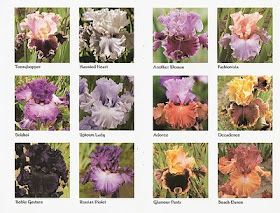
Possibly one of the best heirloom irises in class for its deep, clean yellow colouration that came out of the late 1930's with W.R.Dykes (the Iris) included in the parentage. Grows well at home, increase plus and the bright yellow blooms resists fade, the form is classic, now growing among some historic blues and variegata classed Irises and its gleaming with a plus.
Stevens Bros, Bulls New Zealand, Novelties 1943-44 CatalogueGOLDEN MAJESTY
This iris ranks as one of the finest of its kind. An iris of gleaming gold!! Striking is this lovely rich yellow for its broad form and well branched stem; a fine colour, very even and rich. A deep yellow. Its rounded dome form is majestic, heavily substanced. 3½ ft 21/-
Schreiner's Iris Lover's catalog 1947:One of the fine golden yellows, it is glistening smooth and does not fade. Of gleaming gold the good sized blooms with splendid dome form are majestic and classic looking. One of the finest iris of its color in its price class."
From the above 1939 Carl Salbach Berkeley, California, German or Bearded Iris Catalog. Of course there are many yellows been introduced these days, but we point out that those we have selected have been so careful choice from actually thousands of fine upstanding yellows in the garden of Sydney B Mitchell, E O Essig, and ourselves. Our past yellows such as Naranja, California Gold, Happy Days, Alta California, Song of Gold, Sunburst, and Golden Bear have all been distinct, and each one has proved itself to be of the same championship rank that we predicted when it was introduced. Despite these past achievements, we consider Golden Majesty to be the finest of all - a truly “five-star” Iris. As to hardiness the half Dykes introductions have done reasonably well, some perfectly so. Golden Majesty is one quarter Dykes and its other three grandparents are among the hardiest Iris of all.
GOLDEN MAJESTY (Salbach 1938) ((DAUNTLESS x W.R. DYKES) X the variety Natoma which is Alta California X King Midas. We very definitely regard this Iris as the best all-purpose yellow ever introduced for it has “everything”. First it has color - softer, yet richer than we had dared to hope for and an Iris; then add perfect form, branching, substance, and you have Golden Majesty. The flowers are very large and of perfect, well domed form; it does not fade; the finish is smooth and glistening; the substance is good; the branching perfect; it is a free bloomer with many blooms (usually nine) to each stalk; and its height brings its rich beauty to a spotlight position - an Iris of gleaming gold, standing out as a alone even among the other finest Iris.
No other Iris can be of deep yellow and still be “yellow”, and the tone is so rich and glistening that we have found no colour on the chart that can match it. The entire stalk is perfectly balanced to give the Iris great poise as well as beauty, and in addition it is deliciously fragrant and stands up perfectly against both wind and rain.
One of four iris that we have ever adjudged as demanding a higher introductory price than our customary price ($25.00), and in such great demand that all rhizomes for last season were sold out before the end of July. It is we feel the “ultimate” in yellow Iris. Stock limited ; not more than one to a customer. Late. 42-inch $25.00
AIS Checklist 1939
GOLDEN MAJESTY Salbach, 1937 TB MLa Y4D ((DAUNTLESS x W.R. DYKES) X NATOMA).
Available in the USA from, Argyle Acres, Newport Naturals.
As always clicking on the above image will take you to the larger, higher resolution version.
Photo credit and copyright Iris Hunter

















